Mon 12 Apr 2010
Reviewed by David L. Vineyard: ALLAN GUTHRIE – Slammer.
Posted by Steve under Authors , Bibliographies, Lists & Checklists , ReviewsNo Comments
ALLAN GUTHRIE – Slammer. Houghton Mifflin Harcourt, US, hardcover, November 2009. Mariner Books, trade ppbk, September 2010. First Edition: Polygon, UK, softcover, March 2009 (shown).
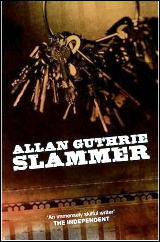
This is a tough minded noirish thriller from British writer Allan Guthrie, who has previously been nominated for the Debut Dagger from the British Crime Writer’s Association and won Theakston’s Old Peculiar Crime Novel award for Two Way Split. His novel Kiss Her Goodbye was nominated for an Edgar and an Anthony.
The man has some credentials for writing his particularly bleak version of the British crime novel. And bleak it is. Compared to Guthrie, Jim Thompson and David Goodies were cockeyed optimists. This one is the literary equivalent of those mad British crime films like Lock Stock and Still Smoking Barrel, but that sort of thing works better on screen than in print.
Nick Glass is a prison guard at the ‘Hilton,’ a Scottish prison with a bad reputation, and between the inmates and his fellow officers he finds himself in a special hell caught between two equally brutal and dehumanizing forces.
You might expect this to develop in classic noir form of a ‘hero’ who stands up to and defeats the forces on both sides after a brutal and bloody struggle, but that isn’t where Guthrie is going, though at times it seems so.
Nick’s life takes an even worse turn when a group of cons in the prison uses outside pressure to threaten Nick’s wife and daughter to force him to do them a ‘favor’ on the outside.
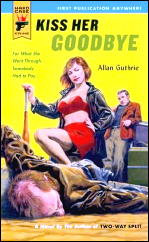
I’d like to quote from the book, but frankly there isn’t much that could be quoted here without heavy editing, and even then it wouldn’t give the feel of the book.
One problem I found with this is that I never cared what happened to Nick Glass. He’s an unappealing protagonist and it’s hard to care about his grim ironic fate. The novel takes a dark turn that I can’t discuss in fairness to Guthrie and anyone planning to read this, but I neither believed it nor felt he brought it off. I’m not sure any writer could bring it off.
Frankly I haven’t decided whether I like this or not. I’ll have to put it aside and come back in a different mood to be sure. The writing is assured and strong, but there is something about this book that made me feel like I needed to stop an take a shower when I finished it.
If the point of the book is that prison is a dehumanizing brutal place, I think most of us knew that going in. If it is that men break in strange ways I think we knew that too. And that’s the problem. I’m not sure exactly what Guthrie is trying to say, other than most of us would be better off to avoid a career in prison from either side of the law.
I suppose there is a certain black humor is watching Nick Glass shatter (sorry, couldn’t resist — and neither does Guthrie or the publisher), but for the life of me I can’t say I cared. He’s a singularly weak and unattractive character, and his attraction to a femme fatale named Lorna only makes him less appealing.
This type of book turns on the reader’s ability to identify with or at least emphasize with the protagonist’s grim predicament. In the case of Nick Glass I’m not sure his fate would have been much better if he had taken a job in the postal service or the mail room. He’s not merely a loser, but a high profile loser of the first order.
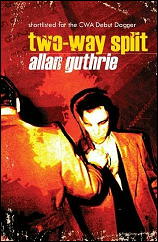
I don’t know where this book was supposed to take me. Where it did take me was to a depressing and bleakly unrelieved place with only a few grim moments of black humor to relieve the pressure — and I’m by no means certain they were even meant to.
Guthrie can write. No question there. And if you want a strong, even stomach churning crime novel with no redeeming characters or features and an outlook as bleak as the gray walls of a Scottish prison, then this is the book for you.
But I’ll have to be honest. I’m not sure if I would want to take this trip again, and when I do read a bleak novel of brutal crime I usually need some sort of cathartic release — even only a sort of grim irony or a satisfyingly operatic blood bath. I didn’t get that from this one, and that may be strictly me and where I am, but we all read books from that subjective point of view, and based on that, the most I can say is you’ll have to decide for yourself.
Ted Lewis’s Get Carter and Gerald Kersh’s Night in the City both did this much better and Georges Simenon’s Stain on the Snow showed us even the most unappealing protagonist could hold out attention. For that matter I can think of a half dozen stunning little British crime films from the last decade that all would be a better investment in time and money.
I wanted to like this one better. I went in expecting pretty much what I got, but I have to say that for me this one is an unappetizing and disappointing outing. That said, I’ll look up Guthrie’s previous novel and probably read his next. The talent is there if he can just tie it to some human element that we can identify with and care about.
I’m not sure Guthrie failed at what he sat out to do, only that he failed to make me care.
Bibliography: ALLAN GUTHRIE.
Two Way Split (2004)
Kiss Her Goodbye (2005)
Hard Man (2007)
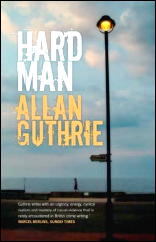
Savage Night (2008)
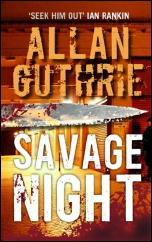
Slammer (2009)
Killing Mum (2009)